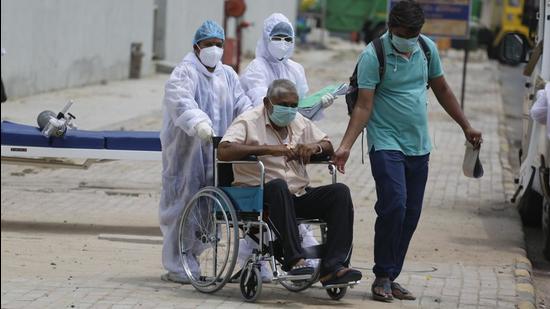India’s health system has collapsed
As human tragedy unfolds, there is a shortage of everything — oxygen, drugs, beds, vaccines, even cremation space
“We have collapsed, Maharashtra is sinking and other states will follow.”

The starkness of these words from Dr Jalil Parkar, a top pulmonologist in Mumbai’s Lilavati Hospital, silenced me in a way that little has through 2020 and 2021, when most of my journalistic energy has been spent on reporting the Covid crisis on the ground. “This is worse than World War Two,” Parkar said, lashing out in rage and hurt at how doctors and health workers are still targeted by angry and distraught families as well as armchair commentators “who sit behind their laptops and in their ivory towers”.
Among other issues, Parkar’s reference was to a leaked video from his hospital which showed patients being treated in a lift-lobby packed with patients, and the simple-minded judgments that followed.
He is absolutely right. There will be another day to analyse the broken health care system, the woeful underspending (less than 2% of GDP) on public health, and whether Covid has pushed us towards a new policy framework.
Also Read | Plea in Supreme Court to give Covid-19 vaccine to all above 18 years
For now, on the ground, after tracking cremation grounds and graveyards, meeting doctors and nurses inside Covid ICUs, travelling with ambulance drivers and spending hours at testing centres, I can authenticate the fact that everything — and I mean everything — is running short.
The most critical shortfall is that of oxygen. An hour from Mumbai in the Vasai-Palghar belt, eight patients died in a single day at the Vinayaka private hospital because oxygen ran out. I met the wife, son and daughter of one among them — Ram Babu, a tailor — in their tiny one-room apartment. At the centre of the room, taking pride of place, sat his sewing machine, placed on a high table, as the family sat on the cold floor, in paralysed grief.
In small residential colonies, behind closed doors, are the real people behind the clinical numbers. In the city itself, at a Covid hospital in Chembur, I saw already over-stretched ward staff, going to hunt for oxygen an hour-and-a-half away, bringing it back in tiny lorries, which they would then unload and pull up, all the while in their medical scrubs. “There is at least a 50% shortage here,” said officials at the hospital.
It is not just Mumbai. From Patna, I received a distraught call from a stranger, a young woman who identified herself as Manisha. Her father, just 53 years of age, was being asked by the Ford Hospital in the city, according to Manisha, to try and organise his own oxygen as supplies were just not reaching the facility.
At the SRV Hospital in Mumbai, Dr Rupkatha told me that not just beds but critical drugs such as Remdesivir and Tocilizumab are entirely out of stock. “Sometimes we tell patients to reach out to dealers directly, what can we do.”
Talks have begun with the military and the railways, according to Saket Tiku, the head of Indian Gas Association, on how to ferry oxygen from steel plants in the east of India to the west, where it is most critically needed. But let me translate for you in the unvarnished, chilling words of one of Maharashtra’s top Covid warriors, Dr Swaropp Hegde, what this actually means. “With not enough oxygen, we have to change our line of treatment. This will definitely mean we will see many more deaths.”
The main difference between 2020 and 2021, doctors I meet on the ground in Maharashtra say, is that younger Indians are being infected, among them children as young as five and three. The mutations may mean that instead of calling this a pandemic borne from the coronavirus, we needed to start using the word “viruses” as this strain(s) is playing out in multiple different ways.
Meanwhile, at crematoriums and graveyards, space runs short and the heart stops. In Ghatkopar, I meet a 95-year-old man in a wheelchair waiting to bid farewell to his wife. Another man, younger, angrier, shouts out. “First there was no space in hospitals, now there is no place at the shamshan ghat… Where should we go?”
India’s health system has cracked under the weight of Covid. We are in a national emergency. The images of the election rallies, the religious congregations, the farmers protests — any mass congregation — is not just idiotic, it is an insult to the doctors at the frontline who say they are “exhausted and worn out”.
More than 800 doctors have already lost their lives to Covid. We claim to respect them and salute them every day. And yet, our utter callousness and the bizarre mixed messaging from our politicians — lockdowns for citizens, rallies for netas — are a criminal affront to every health worker on duty.
As Hemant Deshmukh, dean at Mumbai’s KEM Hospital told me, “Right now, we are discussing shortage of beds and drugs and vaccines. What if we run short of doctors?”
Barkha Dutt is an award-winning journalist and author
The views expressed are personal






